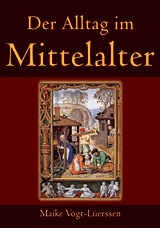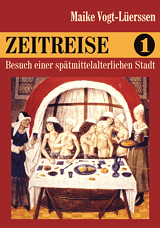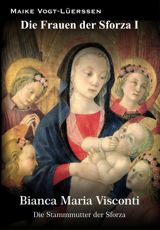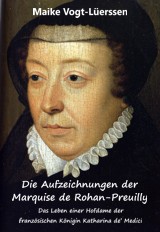Der Alltag im Mittelalter 352 Seiten, mit 156 Bildern, ISBN 3-8334-4354-5, 2., überarbeitete Auflage 2006, € 23,90

Durch die seit vielen Generationen bei den Habsburger betriebene Inzucht - Cousins heirateten ihre Cousinen 1. Grades und Onkel ihre Nichten - gab es mittlerweile viele schwere Krankheiten in dieser Dynastie. Der kleine Philipp Prosper war eines der vielen Opfer dieser Praxis. Er neigte von Geburt an zu epileptischen Anfällen und litt an Skrofulose, einer Hauttuberlose, die zu Entzündungen besonders der Lymphdrüsen und der Haut führt. Einen Monat vor seinem vierten Geburtstag erlag er seinen vielen Leiden. Philipp IV., der diesen Sohn über alles liebte, schrieb an seine Vertraute, die Äbtissin Maria von Agreda: "Mein Schmerz ist groß, wie es natürlich ist, wenn man solchen Schatz verliert."
Ein Zeitgenosse mit dem Namen Barrionuevo schrieb am Tag seiner Geburt (am 5. Dezember 1657): "... They say the Prince is a pretty little chap, and that the King wishes him to be baptized at once, before the extreme cold comes on ... There are to be masquerades, bull-fights, and cane-tourneys as soon as the Queen gets up to see them ..." (in: Martin Hume: The Court of Philip IV. - Spain in Decadence, id., p. 456). "On the 6th of December he [Philipp IV.] rode through the decorated streets of his capital on a spirited Neapolitan charger. Dances, masquerades, and music greeted him on his way, and the public fountains ran wine instead of water, whilst the night was made as light as day by thousands of wax torches. A week afterwards the baptism of the Prince was celebrated in the royal chapel by the Cardinal Archbishop of Toledo (Borja), .... The water they baptized him was from the Jordan , ... brought lately by some friars who came from the Holy House. The Prince screamed lustily when he was baptized ..." (in: Martin Hume: The Court of Philip IV. - Spain in Decadence, id., pp. 458/460).
Über seinen Tod am 1. November 1661 informierte sein Vater am 5. November 1661 seine Vertraute, die Äbtissin Maria von Agreda, in folgendem Brief: "The long illness of my son and my constant attendance at his bedside have prevented me answering your letter, nor has my grief allowed me to do so, until today. I confess to you, Sor Maria, that my grief is great, as is natural after losing such a jewel as this. But in the midst of my sorrow I have tried to offer it to God, and to submit to His divine will; believing most earnestly that He will order all things for the best, which is the most important thing. I can assure you that what grieves me even more than my loss is that I see clearly that I have angered God, and that these punishments are sent in retribution of my sins. I only yearn to know how to amend myself, and to fulfil the divine will by avoiding transgression, with which end I will try my hardest, surrendering my life, if necessary, in order to succeed. Help me, as a true friend, with your prayer to placate the ire of God, and supplicate Him, since He has taken away my son, to send a safe delivery to the Queen [seine zweite Gattin Maria Anna von Österreich] whose confinement we expect every hour [die Geburt ihres Sohnes Karl II. stand bevor]; to protect her, and grant that her offspring should be for His service, for otherwise I desire it not. The Queen has borne the blow as a true Christian, though sorrowfully. I am not surprised at this, for she is an angel. O Sor Maria! if I had been able to carry out your doctrines, perhaps I should not find myself in this state. Pray to God that my eyes may be opened so that I may comply with His will in all things." Und dann folgte ein Postskriptum, geschrieben einen Tag später, also am 6. November 1661: "Our Lord has deigned to send me back my son, by bringing me another [sein Sohn Karl II. wurde am 6. November geboren] ; for which I am as grateful as so signal a boon and mercy demands. Help me, Sor Maria, to prostrate myself at His service, otherwise I desire it not, but to bow my head to His will. The Queen and the child are well, and I am content." (in: Martin Hume: The Court of Philip IV. - Spain in Decadence, id., pp. 491-492).
als Buch

als Buch und als E-book

Zeitreise 1 – Besuch einer spätmittelalterlichen Stadt
als Buch, Independently published, 264 Seiten, 93 SW-Bilder, € 12,54, ISBN 978-1-5497-8302-9
und als E-Book
Neu: Bianca Maria Visconti

Die Frauen der Sforza I: Bianca Maria Visconti – Die Stammmutter der Sforza
nur als Buch (Farbband) bei amazon.de: 294 Seiten, mit Stammtafeln und 243 Bildern, Independently published, 1. Auflage 2020, ISBN 978-1-6515-0580-9, € 43,90

